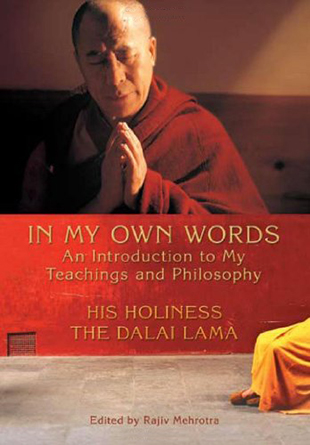Tenzin Gyatso (born July 6, 1935) is the 14th and current Dalai Lama. He is a practicing member of the Gelug School of Tibetan Buddhism and is influential as a Nobel Peace Prize Laureate and as the world's most famous Buddhist monk. He is the leader of the exiled Tibetan government in India. Here is a collection of his writings edited by Rajiv Mehrota and presented by the Foundation for Universal Responsibility of His Holiness The Dalai Lama.
In the opening chapter, His Holiness The Dalai Lama states that the purpose of life is happiness and that the need for love forms the very foundation of human existence. Whereas many powerful leaders around the globe are convinced that anger and hatred are the most dominant human qualities, he believes that position belongs to compassion. It is what really counts in our lives.
In My Own Words contains His Holiness The Dalai Lama's thoughts organized into these chapters: On Happiness, What Is Buddhism?, Essential Buddhist Teachings, The Law of Karma, How to Meditate, The Awakening Mind, Eight Verses for Training the Mind, Meaningful Living and Dying, Understanding Emptiness, Universal Responsibility, and Science at the Crossroads.
Happiness and suffering depend on whether or not our minds are transformed. The Dalai Lama asserts that we can remove disturbing emotions by training our minds. He writes of his own experience:
"Time has passed, and even though I still have not developed the awakening mind, I feel quite close to it. Now I think that if I work hard enough, I may be able to develop it. Hearing and thinking about the awakening mind makes me feel happy and sad at the same time. Like everyone else, I, too, experience negative emotions like anger, jealousy, and competitiveness, but due to repeated familiarity, I also feel that I am getting closer to the awakening mind. It is a unique quality of the mind that once you get familiar with a particular object, your mind gains stability in relation to it. Unlike physical progress, which is subject to natural restrictions, the qualities of the mind can be developed limitlessly. The mind is like a fire, which, if you continually feed it, will grow further. There is nothing that does not get easier with familiarity."
Training the mind is important in relationship to another arena. In his own daily spiritual practice, His Holiness The Dalai Lama meditates on the process of death:
"Remembering the awakening mind automatically brings calmness and peace of mind at the time of death. Cultivating a virtuous state of mind as you die can cause virtuous action to ripen and ensure a good rebirth. Therefore, from the point of view of a Buddhist practitioner, living a meaningful daily life means making yourself familiar with virtuous states of mind, which will eventually help you face death. Whether your experience at the time of death is positive or negative is very much dependent on how you have practiced during you life."
